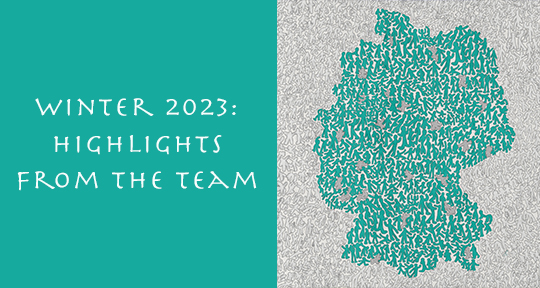This week, our Editors-at-Large take us to book fairs, awards ceremonies, and book launches. From celebrated poets and dearly departed essayists to up-and-coming novelists and prize-winning translators, read on to find out more!
Sofija Popovska, Editor-at-Large, reporting from North Macedonia
The recent publication of The Long Coming of the Fire, a collection of poems by Aco Šopov, translated from the Macedonian by Rawley Grau and Christina E. Kramer, was met with interest and celebration from Macedonian literary critics, journalists, and laymen alike. The book features a total of seventy-four poems, selected by Jasmina Šopova—daughter of the poet and established connoisseur of his work. A selection of Šopov’s poems in Kramer and Grau’s translation was featured in the Winter 2023 issue of Asymptote Journal.
Aco Šopov’s literary output is significant beyond its stylistic excellence and thematic range—it also marks the beginning of the modernist period in Macedonian culture. “His work,” writes N.M. for Nova Makedonija (New Macedonia), “is essential to a poetic movement that freed poetry from the grasp of both the folk oral tradition and the short-lived socialist-realist style, thus directing the [still] tenuous poetic tradition of authors writing in the newly minted Macedonian language towards the expansive spaces of modern European songmaking.” This swift evolution, propelled onwards by the “long strides” of Šopov’s visionary lyric, was the reason Macedonian literature managed to catch up with the still-relevant themes and styles of its European counterpart.
Now, 100 years after Šopov’s birth, the public at large can experience his unforgettable voice through The Long Coming of the Fire, a bilingual Macedonian-English edition published by Deep Vellum Press. In an unusual but successful move, the edition was translated via the synergy of three translators. In an interview organized by the Macedonian Academy of Sciences & Arts, Kramer explains that this translation resulted from the synergy of three unique approaches and skillsets: “Rawley [Grau], who translates poetry very well but doesn’t know Macedonian, me, who knows the Macedonian language very well but not how to translate poetry, and Jasmina, who weaved the threads together in a way that resulted in the creation of a team of translators.” Although, being a linguist, she would’ve “been more comfortable discussing Šopov’s use of nouns and verbs than his poetics”, Kramer notes that his images, recurrent within his poems, “subtly bind” the author’s inner workings to the outside world, creating poetry that is “simultaneously personal and universally human”. READ MORE…



